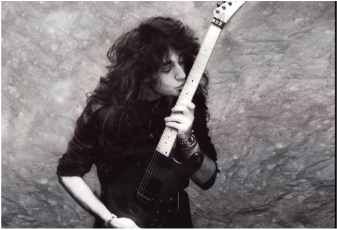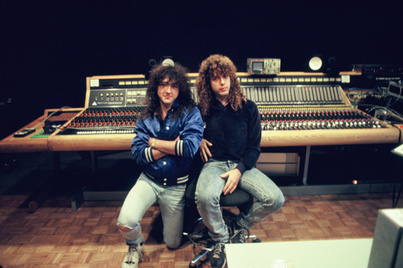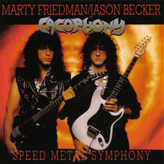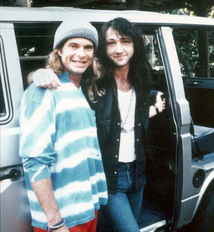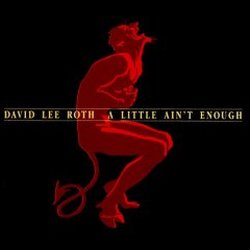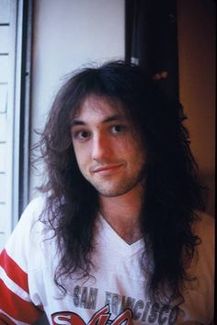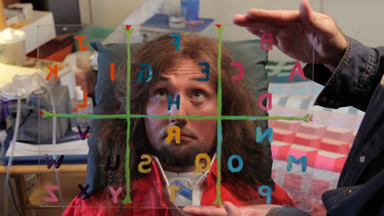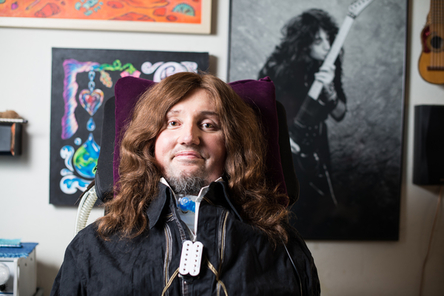Jason Becker’s story is truly a remarkable one. It’s about staying positive no matter what, fighting every day to continue doing what you love most, and sharing your creativity with people around the world despite all odds. To say that he’s a huge inspiration to thousands, if not millions, of people around the world is not an exaggeration.
I first heard about him when I was 14 years old. I was getting into heavy metal music and Megadeth had already become my favorite metal band. I was obsessed with the “Rust in Peace” album and how brilliant the guitar playing was. To this day “Rust in Peace” is still my favorite Megadeth album. One of the key band members of that album was a guitar player named Marty Friedman because it’s rare to hear anything quite as unique as his lead guitar work. In addition, his style seemed to work perfectly with Dave Mustaine’s rhythms. Marty was a new guitar player to me and being the music junkie that I am, I wanted to check out some of his other works so I could hear more of his playing. I started with Cacophony, his band before Megadeth. That led to the discovery of another gifted musician: Jason Becker.
Cacophony toured and released a second studio album called “Go Off!” in 1988. The same year, both players released their respective solo albums – “Perpetual Burn” by Jason and “Dragon’s Kiss” by Marty. In 1989, the band split-up because they wanted to explore other career opportunities but they remained close. (Marty Friedman actually still refers to Jason as “his best friend” and they recently collaborated on a track off of his latest album “Inferno”.) Eventually Marty Friedman joined Megadeth and Jason joined David Lee Roth’s band, who was looking to replace Steve Vai who had joined Whitesnake. This was a huge move for Jason, then only age 20. He was hired to be a part of the recording of “A Little Ain’t Enough” and do the subsequent touring. This was a big opportunity to introduce himself to a wider audience as Roth was still a popular figure thanks to his Van Halen days.
“That’s because I have this illness. They say it’s called ALS, which is a form of Lou Gehrig’s disease. That just got into my leg – actually, both of my legs – so much to where I can just barely walk now. So I kind of have to take care of it and go through some programs.”“Can it be reversed”“Well, technically, no. It’s just a matter of trying everything. It’s actually doing okay.”
Full interview can be found here.
Unfortunately Jason’s situation worsened from that point on. He gradually lost the ability to walk and play guitar. Between 1996-97, he also lost the ability to speak. Today he is confined to a wheelchair. Living in his Richmond, California home his parents and close friends care for him on a daily basis. Jason’s life has been a very difficult one. It saddens me to think that if he didn’t have ALS, he’d have likely become one of the most popular guitar players around the world. He would be doing clinics, meeting fans, releasing solo albums, exploring different musical styles, touring around the world- everything you can imagine from a guitar virtuoso. He was on the brink of all of this when he was diagnosed with ALS.
It’s a heartbreaking situation, but Jason is a fighter. Somehow, despite all odds, he was able to stay connected to the music world. He is truly an inspiration and it’s music, not the disease, that defines him.
After he was diagnosed with ALS, Jason kept composing music. If there were notes in his head, he wasn’t going to let anything get in the way. The fruit of his labor came in 1996 with the release of his second solo album, “Perspective”. It features 9 songs and is one of the most unique and diverse albums that you can ever hear. It really is impossible to put a genre label on it so I won’t attempt it. One thing that is quite apparent is that even with instrumental music you can tell what he was going through while working on the album – some guitar work, especially on “Rain”, reminds me of Brian May’s guitar work on Queen’s “Innuendo” as they were recorded while Freddie was very ill. It’s mostly an instrumental album (with the exception of the Bob Dylan cover “Meet Me in the Morning”) and still features a lot of guitar, just not in the same “shred” vein as his previous works.
Speaking of the guitar parts, unfortunately Jason was gradually losing muscle strength as he was working on the album, so he could only play guitar on 5 of these songs and he had some guest musicians, such as Michael Lee Firkins and Steve Perry, who played on the other 4 and put Jason’s vision into notes. He switched to keyboards after a while; but when he was no longer able to play any instrument, he used a specially designed computer software where he was able to enter notes using eye movements. It’s why you also notice that there’s a lot more keyboards on this album and a lot more “classical” feel to certain songs, compared to his earlier work with Cacophony or his previous solo album. Each song stands on its own; but the opening track, “Primal”, is definitely my favorite on the album. It’s got a haunting melody and is just one of those songs that hits you hard, especially when you know what must have gone through the mind of its composer at the time.
After “Perspective” he released “The Raspberry Jams” (1999) that contained previously unreleased demos and “The Blackberry Jams” (2003) with some demo tracks and alternate versions of some songs. In 2008, he released “Collection” with three new tracks along with older recordings. He also still collaborates with other musicians, sometimes recruiting their help to get his musical ideas played on a guitar, other times contributing a song or an idea to somebody else’s album. In fact, he recently collaborated with Marty Friedman on Marty’s latest album, “Inferno”, on a track called “Horrors” and Marty said of Jason’s situation and working with him again; “His spirit is just perfect. (…) And now people will hear the incarnate of something that we’ve done together in 2014, and I’m just so glad that it’s happening. And it’s a very important part of my record. I mean, it’s a big, important part of the record.”
I called him an influence earlier and there is a reason for that. Marty explained it best – his spirit is perfect! Reflecting on what he had to go through you can see the extreme physical and mental pains when he was just so young and on the verge of launching a global music career. He could have easily given up and no one would have blamed him for it. He could have chosen to fill his days going between anger and sorrow and not be in touch with his friends. And he admits that in the ’90s, when the disease was getting worse and worse everyday, he did go through these negative emotions for a bit – but his “desire to live with vigor” remains with him to this day. He is still composing music; communicating with other musicians using the eye chart and telling them what notes to play into a computer software and he then works with producers to arrange the notes and arrive exactly at the sound he had in his head. If there is any melody in his head, he simply won’t let anything get in the way.

“I spend time editing and massaging each note. Then I start layering with different instruments, adding harmonies, counterpoint, and whatever the song calls for. Then I arrange it into a whole piece, and decide where I need to add live musicians. It takes a lot of time, but it is very satisfying once it is complete.”
Full interview can be found here.
-Jason Becker, 2013-
I think that it’s important to know Jason’s story because he shows you that you can keep following your passion with a positive attitude no matter what. Think about some of the things that we complain about on a daily basis… You can argue that it’s human nature to complain about certain things in life. Especially when things don’t go our way for a period of time and we tend to feel like we won’t ever finish what we originally intended to do. But that’s exactly why it’s important to know who Jason Becker is and what he has been able to accomplish, despite all odds. He had this awful disease that got in the way of so many things. But he never gave up, never stopped having fun, never quit making music, and he refused to let ALS take away his desire to live. There is a lot to learn from him and I think that’s why he is such an inspiration to many people around the world.
If you feel like circumstances are not allowing you to follow your passion, don’t let that bring you down. Where there’s a will, there’s a way. Ask Jason, he’ll tell you!
http://jasonbeckerguitar.com/
http://jasobrecht.com/jason-becker-complete-1990-interview-david-lee-roth-cacophony-2/
http://www.sfgate.com/music/article/Musician-Jason-Becker-refuses-to-let-ALS-silence-4816989.php
http://www.guitarplayer.com/artists/1013/jason-becker-super-hero/22307
http://www.popmatters.com/review/beckerjason-perspective/
http://xombiewoof.blogspot.com/2014/09/jason-becker-still-not-dead-thank-rock.html
https://www.youtube.com/watch?v=x_u9TtGdyfk

